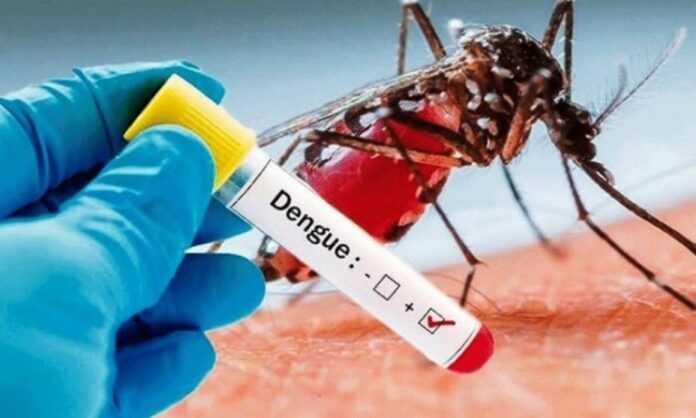Advertisement
The
Ghana
Health
Service
(GHS)
has
highlighted
the
ongoing
activities
to
tackle
the
Dengue
outbreak
after
confirming
36
cases
from
both
Eastern
and
Central
Regions.
The
36
cases
were
detected
in
the
communities
by
healthcare
workers
using
an
appropriate
Case
Definition,
the
GHS
said.
The
GHS
issued
a
Press
Release
on
Monday
14th
July
2024,
announcing
an
outbreak
of
Dengue
in
some
districts
of
the
Eastern
Region.
Dengue
fever
spreads
to
Central
Region
–
Clinical
Epidemiologist
As
part
of
the
response
measures,
a
team
from
the
National
level
made
up
of
Entomologists
and
Epidemiologists
joined
the
regional
team
to
undertake
a
detailed
outbreak
investigation.
The
investigation
has
been
carried
out
across
adjoining
districts
in
Eastern
and
Central
Regions
with
reported
surge
in
malarial-like
conditions.
Many
more
samples
from
suspected
cases
have
been
submitted
to
Noguchi
Memorial
Institute
for
Medical
Research
(NMIMR)
for
confirmation.
“As
at
today,
17h
July,
2024,
we
have
confirmed
36
cases
from
both
Eastern
and
Central
Regions.
Outbreak
of
Dengue:
GHS
confirms
36
cases
from
both
Eastern
and
Central
Regions
“These
cases
were
detected
in
the
communities
by
health
care
workers
using
an
appropriate
Case
Definition.
It
is
worthy
to
note
that,
of
all
these
cases,
only
one
(1)
was
admitted
but
has
been
discharged.
The
remaining
are
all
being
managed
at
home
and
are
stable,”
the
statement
by
the
GHS
said.
All
are
reminded
of
the
symptoms
of
dengue,
and
these
include:
Sudden
onset
of
high-grade
fever;
Severe
headache
(mostly
in
the
forehead)
Body
aches
–
muscle,
bone
and
joint
pains;
Nausea
and/or
vomiting;
Rash.
The
GHS
highlighted
ongoing
activities
to
fight
the
outbreak.
These
are
“Orientation
of
clinicians
on
the
case
definition
at
all
levels
including
CHPS
compounds,
meetings
held
with
key
stakeholders,
i.e.
District
Health
Management
Teams,
M/DCES,
Chiefs;
Community
durbars;Risk
communication
in
the
affected
districts
We
continue
to
urge
the
general
population,
especially,
those
in
the
affected
areas
to
prevent
mosquito
bites
by
doing
the
following:
1.
Wear
protective
clothing
2.
Use
mosquito
repellents
3.
If
you
must
keep
water
containers
around
your
home,
ensure
it
is
tightly
covered,
4.
Discard
water
in
containers
if
the
water
is
not
being
used
5.
On
the
farms,
also
ensure
that
receptacles
that
could
collect
water
such
as
empty
cocoa
pods,
coconut
shells
etc.)
are
discarded
(crushed,
buried
etc)
properly
6.
If
sleeping
during
the
day
or
outside,
sleep
in
an
insecticide
treated
bed
net
7.
Do
not
self-medicate:
report
to
the
nearest
health
facility
when
you
have
high
grade
fever.


